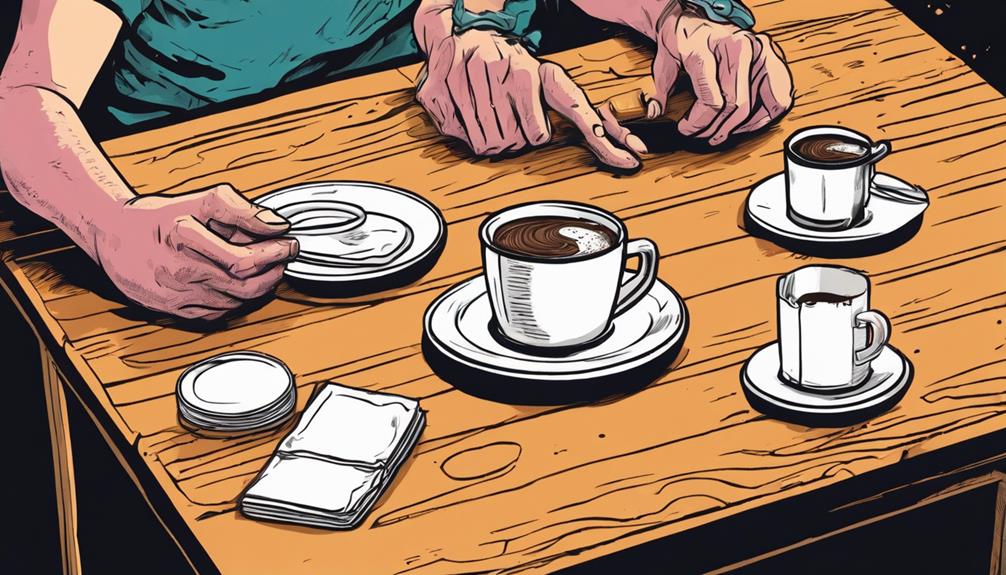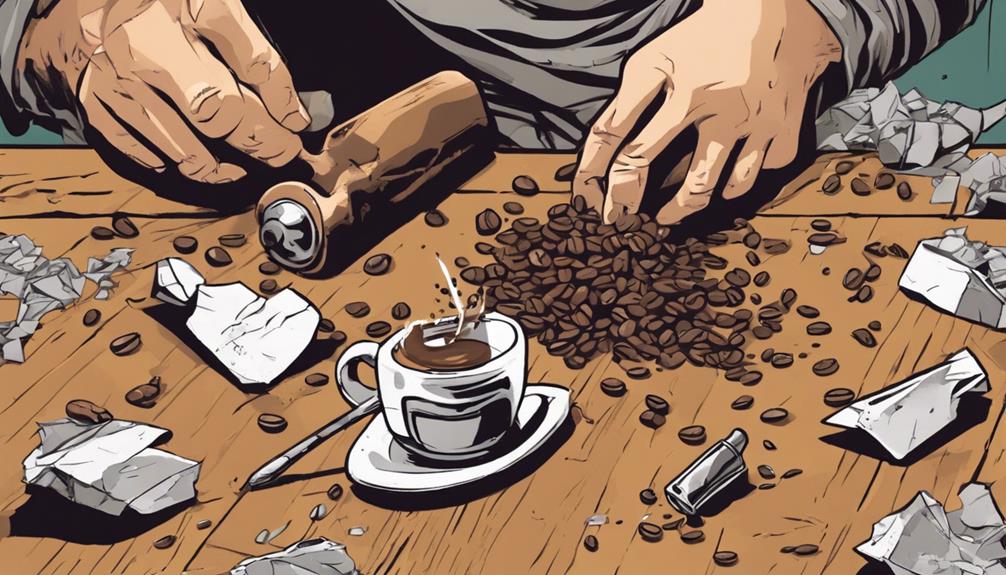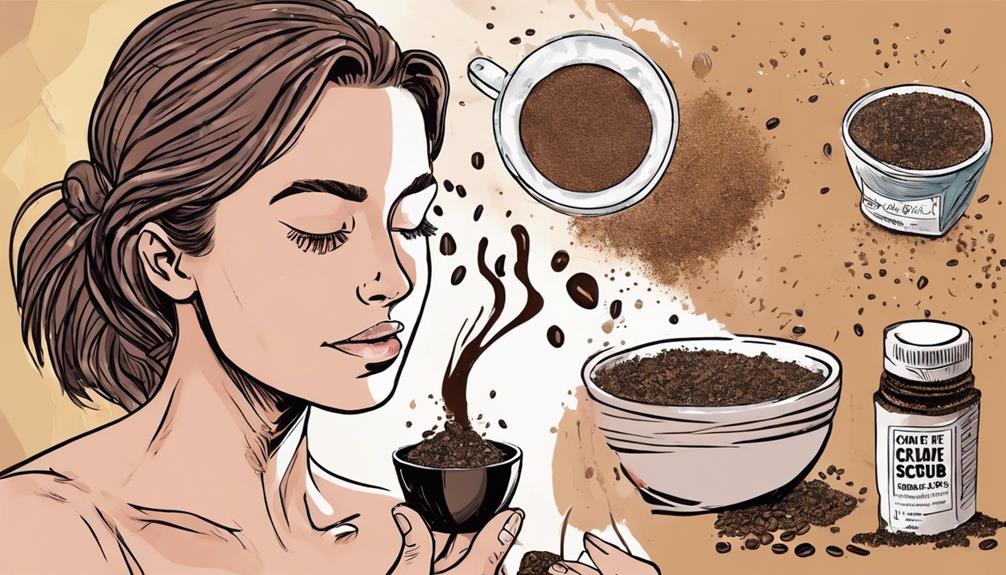To maintain the brightness of your teeth, add some milk to your coffee and drink it with a straw. These easy tips can help prevent coffee stains from sticking to your teeth. Additionally, remember to rinse with water after finishing your coffee to remove any leftover residues. Good oral hygiene, such as daily brushing and flossing, is crucial for keeping your smile radiant. If you are interested in finding more ways to fight coffee stains, there are professional whitening treatments available that can offer powerful results. Make sure to seek out more advice on how to keep your teeth white.
Key Takeaways
- Add milk to coffee to reduce staining; proteins bind to polyphenols.
- Drink coffee through a straw to minimize direct contact with teeth.
- Rinse mouth with water to dilute coffee residues and prevent staining.
- Maintain good oral hygiene with proper brushing and flossing techniques.
- Consider professional whitening treatments for effective removal of coffee stains.
Preventing Coffee Stains With Milk
To prevent coffee stains on your teeth, consider adding milk to your coffee as it helps reduce discoloration and protect against staining. The proteins in milk bind to the polyphenols in coffee, preventing them from sticking to your teeth and causing discoloration. Additionally, the higher fat content in milk provides increased protection against coffee stains on your teeth. By choosing animal milk over soy milk, you can enhance this protective effect.
When you drink coffee with milk, the milk helps move coloring agents in the coffee to your stomach instead of allowing them to adhere to your teeth. This simple addition not only lightens the color of your coffee but also minimizes the chances of it staining your teeth.
Drinking Coffee Through a Straw
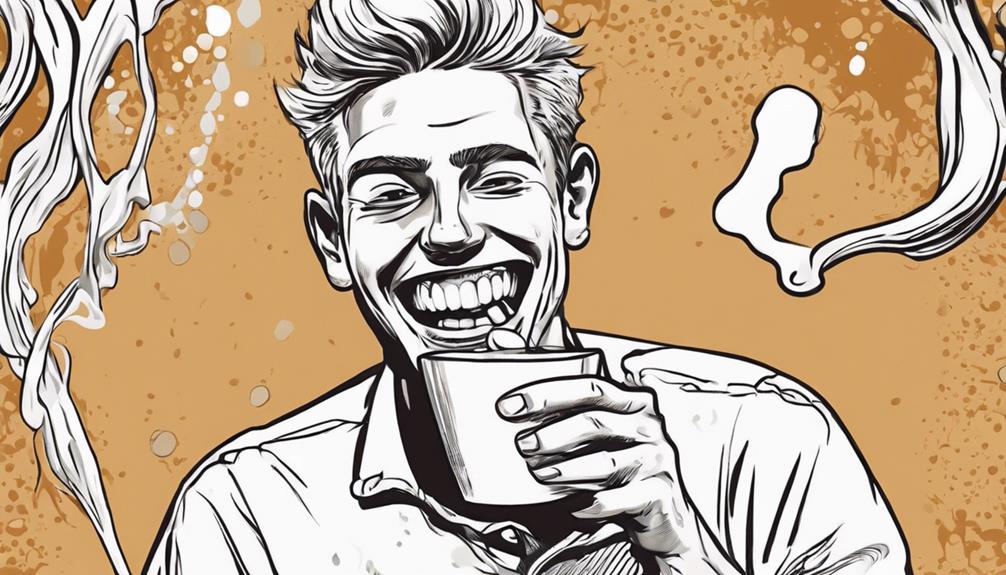
Consider using a straw while enjoying your coffee to help prevent stains on your teeth. Straws are a simple yet effective way to minimize direct contact between the coffee and your front teeth, reducing the risk of staining.
By using a straw, you can prevent polyphenols present in coffee from sticking to your tooth enamel, thus avoiding the yellow and brown hues that can affect your smile. While it may seem unconventional, sipping your coffee through a straw can play a noteworthy role in maintaining a whiter smile.
Additionally, using a straw can limit the exposure of your teeth to coffee, which is particularly beneficial if you consume multiple cups throughout the day. Whether your preference is hot or iced coffee, opting for a straw can notably reduce the potential staining effects on your teeth.
Water Consumption for Rinse
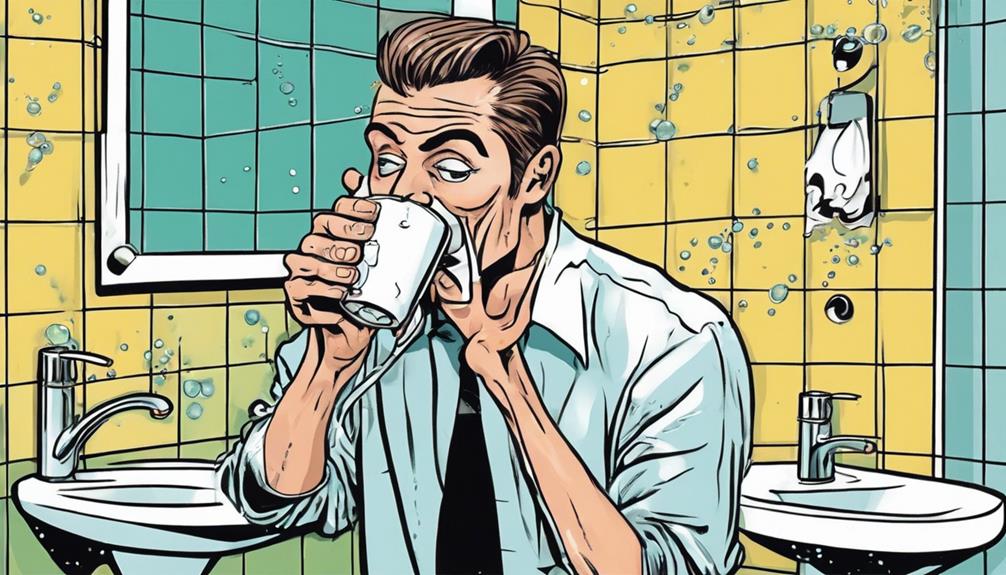
Drinking water after your coffee can effectively rinse away residues and help prevent teeth staining. Water acts as a natural cleanser, diluting the coffee in your mouth and preventing it from clinging to your teeth.
Swishing water in your mouth after drinking coffee helps wash away acidic compounds that contribute to staining. Additionally, water consumption alongside coffee promotes saliva production, aiding in neutralizing acids and protecting your teeth from damage.
Good Oral Hygiene Practices
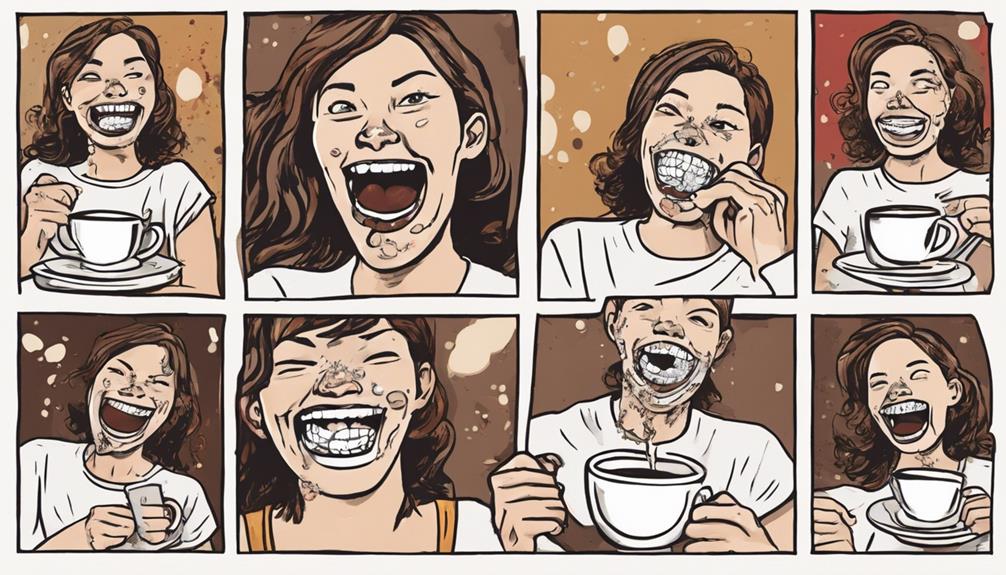
To maintain good oral hygiene and prevent coffee stains on your teeth, focus on proper brushing techniques and the importance of flossing daily.
Brushing your teeth twice a day and flossing regularly can help remove plaque buildup and reduce the risk of staining.
Brushing Techniques
Using a soft-bristled toothbrush is vital for preventing enamel damage while effectively removing coffee stains during brushing. To maintain good oral health and prevent coffee stains, it's important to brush your teeth at least twice a day for two minutes each session.
When brushing, make sure to use gentle circular motions to cover all surfaces of your teeth, including the gum line and your tongue. By incorporating these techniques, you can make sure that coffee stains are effectively removed, and your enamel remains protected.
Additionally, consider using fluoride toothpaste recommended by your dentist for added protection against enamel damage and coffee stains. Proper brushing techniques not only help in removing stains but also contribute to overall oral health.
Flossing Importance
Regular flossing is important for maintaining ideal oral hygiene and preventing dental issues. By flossing daily, you can effectively remove plaque and food particles that brushing alone may miss. This helps prevent cavities, gum disease, and bad breath. Dentists suggest incorporating flossing into your daily oral care routine to ensure peak oral hygiene.
To floss correctly, use a piece of floss about 18 inches long and gently slide it between your teeth, moving it up and down along the sides of each tooth. Proper flossing technique is vital in removing debris and bacteria that can lead to gum disease. Flossing before brushing can help dislodge food particles and plaque, allowing the toothbrush to clean more effectively.
Whitening Options for Coffee Stains
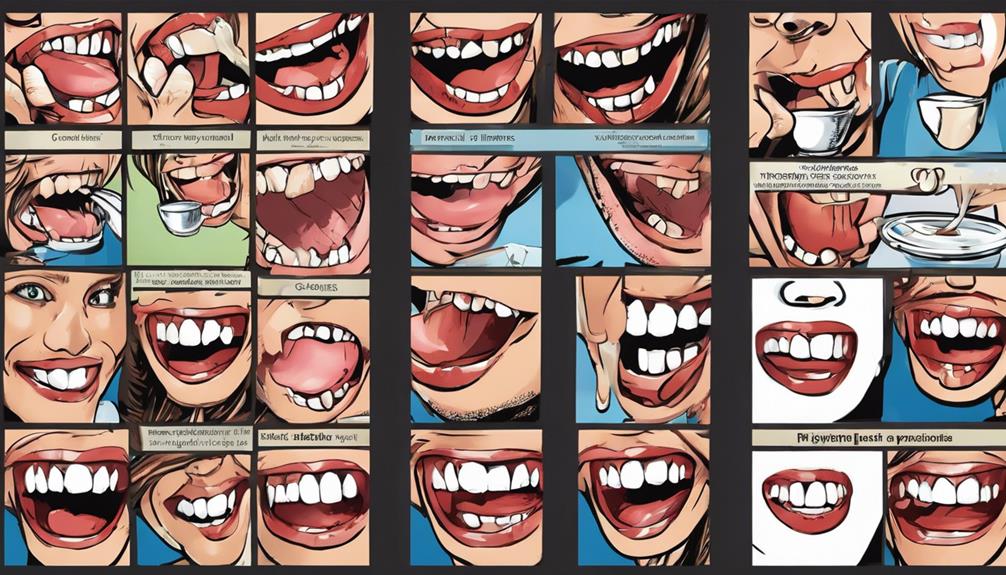
For effective removal of coffee stains on your teeth, consider professional whitening treatments as they are more potent than at-home methods. These treatments, performed by a dentist, can provide you with long-lasting results that effectively eliminate stubborn coffee stains. However, if you prefer at-home solutions, whitening toothpaste and mouthwash can also help in reducing the appearance of these stains. Remember, maintaining good oral hygiene practices is vital in preventing coffee stains on your teeth in the first place.
To help you make an informed decision, here is a table summarizing the whitening options available:
| Whitening Option | Description | Effectiveness |
|---|---|---|
| Professional Treatments | Conducted by a dentist for potent whitening | Highly Effective |
| Whitening Toothpaste | Contains mild abrasives to remove surface stains | Moderate Effectiveness |
| Whitening Mouthwash | Helps maintain whiteness and freshen breath | Limited Effectiveness |
Health Risks of Coffee Stains
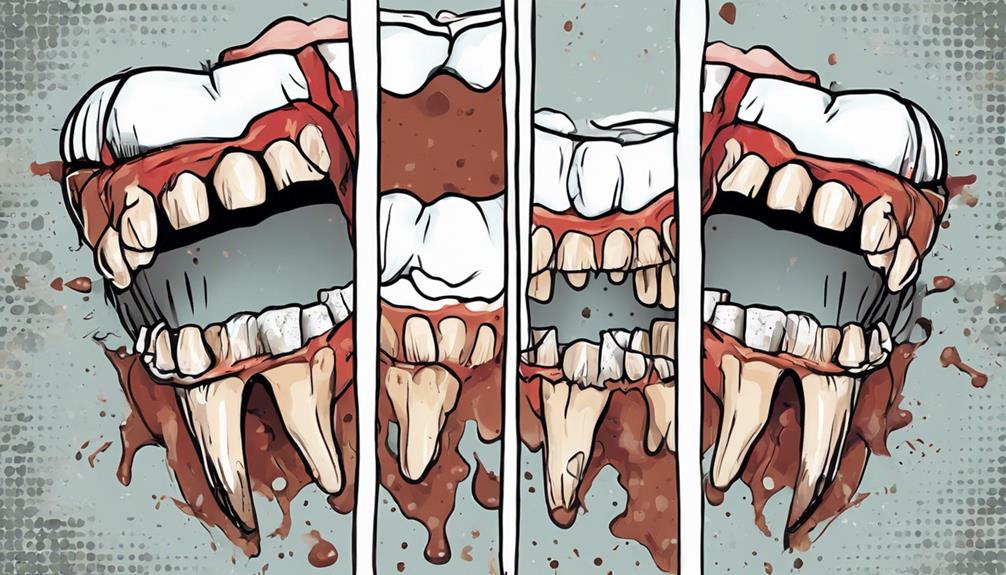
Coffee stains on teeth pose significant health risks, including discoloration, enamel damage, plaque buildup, and an increased risk of tooth decay.
The tannins present in coffee are responsible for the staining effect on teeth, leading to unsightly discoloration. Enamel, the outer layer of teeth, can be compromised by these stains, making teeth more vulnerable to decay and sensitivity.
Additionally, the plaque that accumulates from coffee consumption can contribute to the development of cavities and other oral health issues.
To mitigate these risks, preventive measures are essential. Regular brushing and flossing after consuming coffee can help remove surface stains and prevent plaque buildup. Using a straw to drink coffee can minimize direct contact with teeth, reducing the risk of staining.
Moreover, scheduling regular dental cleanings and check-ups can aid in the early detection and management of any coffee-related dental issues. By taking these steps, you can enjoy your favorite beverage while safeguarding your oral health.
Impact of Drinking Habits on Teeth
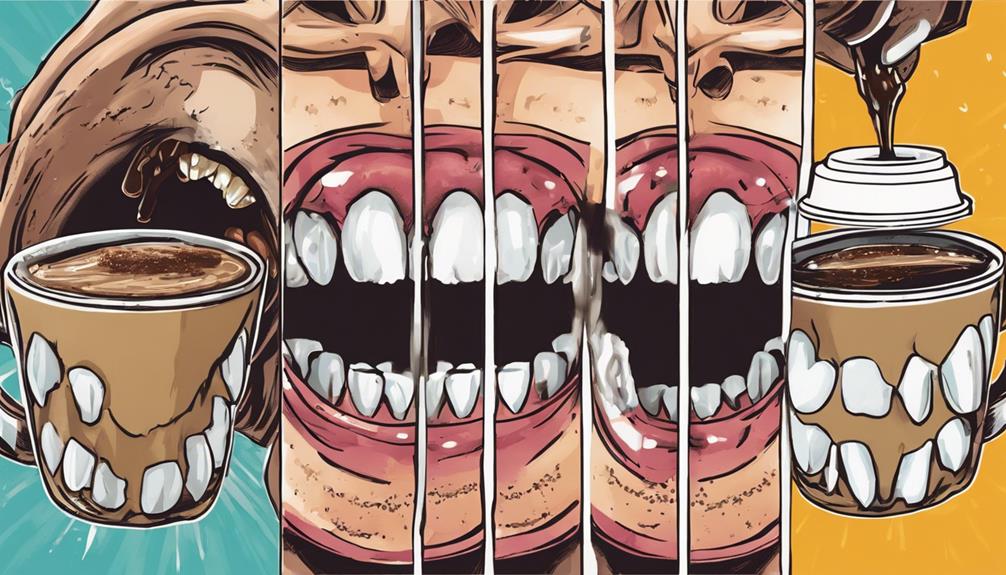
When drinking coffee, your habits can greatly impact the health of your teeth. To minimize the staining effects of coffee on your teeth, consider your drinking behaviors.
Drinking water alongside coffee can help flush out residues and reduce staining. Avoiding sugary coffee beverages can prevent plaque buildup and tooth decay.
After consuming coffee, make it a habit to brush your teeth or rinse your mouth to lower the chances of coffee stains forming. Using a straw while drinking coffee can also help by limiting direct contact with your teeth, thereby decreasing the risk of staining.
Additionally, regular dental check-ups are vital for detecting and addressing any coffee-related issues that may be affecting your oral health. By being mindful of your drinking habits when consuming coffee, you can take proactive steps to maintain a sparkling smile and healthy teeth.
Frequently Asked Questions
How Do You Prevent Coffee From Staining Your Teeth?
To prevent coffee stains on your teeth, try drinking through a straw to limit contact, increase water intake to rinse residue, and maintain good oral hygiene by brushing and flossing regularly. Avoid adding sugary milk, as it can worsen staining.
How to Keep Your Teeth White if You Drink Coffee?
To keep your teeth white while enjoying coffee, consider using milk in your brew. Add a straw for sipping and opt for lower caffeine options. Remember to brush or rinse after. Professional whitening treatments can help too!
How to Get Caffeine Without Staining Teeth?
To get caffeine without staining teeth, opt for lighter coffee roasts or switch to green tea. Use a straw while drinking and rinse with water afterward. Consider whitening toothpaste for added protection. Keep those pearly whites sparkling!
Does Drinking Coffee With a Straw Prevent Teeth Staining?
When sipping through a straw, you're shielding your pearly whites from coffee stains. It's a simple trick that keeps your smile bright. So next time you indulge, remember, a straw can be your teeth's best friend.
Conclusion
So, there you have it! By following these simple tips, you can keep your teeth sparkling and avoid those pesky coffee stains. Another key factor in preventing coffee stains on your teeth is to be mindful of how coffee affects tooth enamel. The acidity in coffee can weaken the enamel on your teeth, making them more susceptible to stains. To counteract this, consider drinking water after your coffee to help rinse away any lingering acids and protect your enamel. Additionally, using a straw when drinking coffee can help minimize direct contact with your teeth, reducing the risk of stains.
Remember, a straw is your best friend, and milk is the secret weapon against discoloration.
Keep up with good oral hygiene and maybe even try some whitening options for that extra pizzazz.
Your smile will be so bright, it'll blind the sun!

